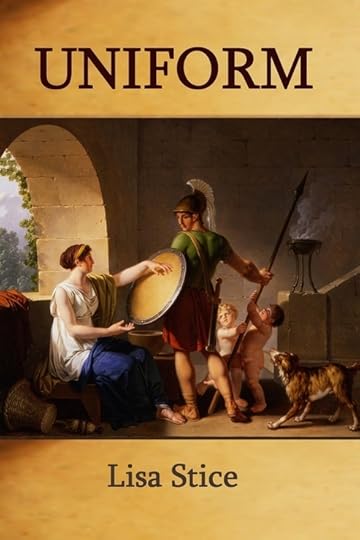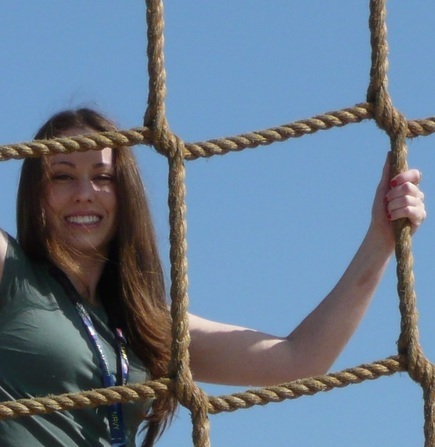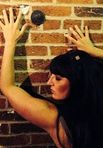Carpe Noctem Book Interview With Lisa Stice
 Aldrich Press, 2016 THINGS WE’RE DYING TO KNOW…
Aldrich Press, 2016 THINGS WE’RE DYING TO KNOW…Let’s start with the book’s title and your cover image. How did you choose each? And, if I asked you to describe or sum up your book, what three words immediately come to mind?
I wanted a multitasking title, and I think Uniform does that. Of course, there is the connotation to military clothing (camouflage, alphas, bravos, charlies, dress blues), but there is also the message of sameness. For the service people, that sameness can be the unity of brotherhood and esprit de corps. For me as a dependent, uniform alleviates some of the feelings of isolation and loneliness. There are hundreds of thousands of dependents who
are left behind when their spouses/fathers/mothers go on deployment; we all share the same fears, frustrations and pride. The painting I chose for my cover honors those who serve and those they leave behind, showing the strength of all. I also like that Le Barbier’s painting is a reminder of the long history of war. The emotions and sacrifices involved are the same no matter the time period.
Three words: tradition family commitment.
What were you trying to achieve with your book/book? Tell us about the world you were trying to create, and who lives in it.
I hope Uniform opens up communication between partners, parents and children, friends, neighbors and co-workers. The more we open ourselves to others, the closer we become.
Can you describe your writing practice or process for this collection? Do you have a favorite revision strategy?
My initial writing was a catharsis. For so long, my poems were spoken by fictitious speakers. I realized I had been avoiding writing about my own life. Once I started, the poems just came. I was writing at least two poems a day. Most of the poems were throw-aways that I would never want to show anyone. I honed the savables down to a select few and then I entered into a long period of revision. As I revised, I cut more poems and wrote new ones. Finally, I came to a place where I felt the collection was what it should be.
How did you order the poems in the collection? Do you have a specific method for arranging your poems or is it sort of haphazard, like you lay the pages out on the floor and see what order you pick them back up in?
I chose to create sections: I. the indoctrination into the Corps II. deployment III. post-deployment. To balance the emotions, I tried to alternate as much as I could between more distanced poems and more internal poems.
Can you share an excerpt from your book? And tell us why you chose this poem for us to read – did it galvanize the writing of the rest of the collection? Is it your book’s heart? Is it the first or last poem you wrote for the book?
How Foolishly He Had Acted
All he wanted to do
when he came home
was turn on the TV,
then lie on the couch
and curve his back
to the screen and withdraw.
He didn’t even want to eat,
but you kept insisting
going into great detail
about how many stores
before you found crème fraîche,
how you cut your finger
peeling potatoes, how you hated
chopping onions but diced four,
how you wanted this dinner
to be perfect,
how the tenderloin had to be marinated overnight
then braised for three hours,
how you made hot cross buns
from scratch and had to knead
the dough and let it rise,
then kneaded it again
and let it rise a little more
to show how much you missed him
to show him what he had missed.
Your love was designed to make him feel guilty.
And when you asked,
Are you at least going to help me wash dishes,
he knew it would just make you mad,
but he said No
I chose to share this poem because it is my most vulnerable and demonstrates the distance silence creates. It is in the post-deployment section.
For you, what is it to be a poet? What scares you most about being a writer? Gives you the most pleasure?
Being a poet means putting life and feeling into words, all the little ugly moments and all the humbling beautiful moments. My fears are failure and judgment, and my greatest pleasure is when someone tells me he/she connected to one of my poems.
Are there other types of writing (dictionaries, romance novels, comics, science textbooks, etc.) that help you to write poetry?
For this collection, all my past reading of military non-fiction and poetry written by war veterans helped me connect to the culture of the Corps and the military in general. As a spouse, I’m within and without at the same time. I already know the civilian side by heart; I’m still learning the military side.
What are you working on now?
The collection I’m working on now is inspired by our recent PCS (Permanent Change of Station: ordered move) and the effects of that move on our toddler daughter. Many of the poems in that collections are also inspired by Sun Tzu’s The Art of War and classic children’s books.
What book are you reading that we should also be reading?
Randy Brown’s Welcome to FOB Haiku is an awesome poetry collection I’ve recently read. I just started reading Eva Saulitis’ Becoming Earth; it’s a highly emotional collection of essays about dying. I’m always a fan of anything by Belfast poet Ciaran Carson.
Without stopping to think, write a list of five poets whose work you would tattoo on your body, or at least write in permanent marker on your clothing, to take with you at all times.
Ciaran Carson
Emily Dickinson
Edward Thomas
John Betjeman
Wislawa Szymborska
***
Purchase Uniform.
 Lisa Stice is a mother, military spouse and poet. It’s difficult to say where home is because it changes so often, but she currently lives in North Carolina with her husband, daughter and dog. Find her online at
Lisa Stice is a mother, military spouse and poet. It’s difficult to say where home is because it changes so often, but she currently lives in North Carolina with her husband, daughter and dog. Find her online athttps://lisastice.wordpress.com.
Visit Lisa:
Goodreads
Author profile on Poets & Writers
Published on August 10, 2016 04:00
No comments have been added yet.



